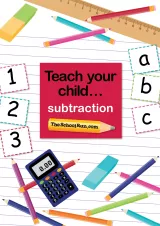
Help support your child's maths learning at home with a practical, targeted eBook. Subtraction topics covered include subtraction on a number line, complementary subtraction, column subtraction, subtracting decimal numbers and subtracting negative numbers. As well as parents' notes on the theory your eBook contains lots of practical activities and games to help your child practise what they're learning at home.
Teach your child subtraction is a reference guide and home-teaching kit which will help you understand exactly what subtraction-related skills your child is expected to have mastered in each year of the primary school curriculum. Primary school teacher and parent Matt Revill has compiled information, tips and activities to ensure that you have the right information at your fingertips so you can quickly make sure your child has fully grasped and achieved each and every skill for their correct year group and using the same methods that they are taught (rather than confusing them with the one you were taught at school!). You'll be able to print off highly targeted and child-friendly fun worksheets to help them master each of the essential skills as they progress through school – in fun, five-minute sessions.
In Teach your child subtraction, you’ll discover:
- The vocabulary/terminology your child is being taught at school, so you can use the same concepts at home.
- An explanation of the methods they’re taught to use so you don’t end up doing more harm than good by trying to teach them in a different way.
- Why it is so important to talk to your child about their learning so that they understand that feeling nervous or confused about maths is normal and something you can overcome together.
Introduction
- What children are taught about subtraction in each year group
- Key subtraction vocabulary
- Some general tips to help your child
Worksheets and games
- Subtraction in Reception
- Subtraction in Y1
- Subtraction in Y2
- Subtraction in Y3
- Subtraction in Y4
- Subtraction in Y5
- Subtraction in Y6
- Worksheet answers



